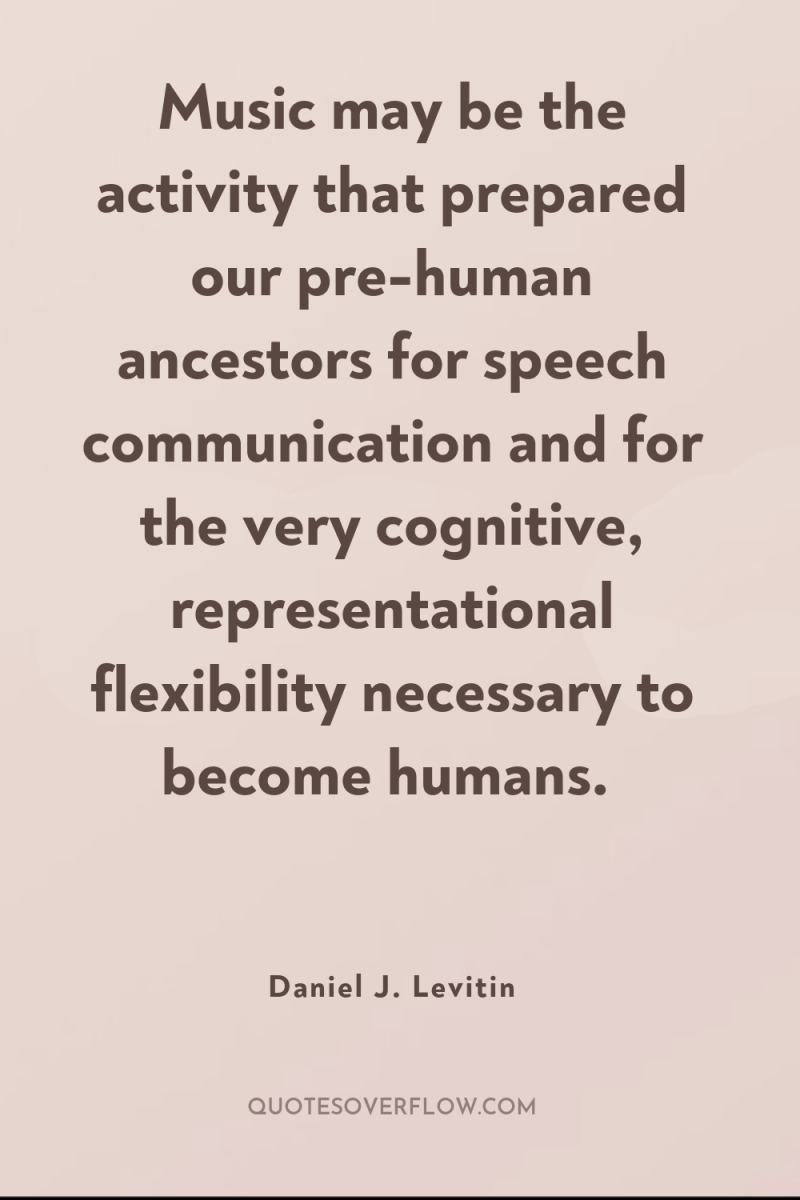1
If music serves to convey feelings through the interaction of physical gestures and sound, the musician needs his brain state to match the emotional state he is trying to express. Although the studies haven't been performed yet, I'm willing to bet that when B.B. King is playing the blues and when he is feeling the blues, the neural signatures are very similar. (Of course there will be differences, too, and part of the scientific hurdle will be subtracting out the processes involved in issuing motor commands and listening to music, versus just sitting on a chair, head in hands, and feeling down.) And as listeners, there is every reason to believe that some of our brain states will match those of the musicians we are listening to. .Daniel J. Levitin
2
It’s usually obvious when you’re talking to somebody a level above you, because they see lots of things instantly when those things take considerable work for you to figure out. These are good people to learn from, because they remember what it’s like to struggle in the place where you’re struggling, but the things they do still make sense from your perspective (you just couldn’t do them yourself). Talking to somebody two or more levels above you is a different story. They’re barely speaking the same language, and it’s almost impossible to imagine that you could ever know what they know. You can still learn from them, if you don’t get discouraged, but the things they want to teach you seem really philosophical, and you don’t think they’ll help you–but for some reason, they do. Somebody three levels above is actually speaking a different language. They probably seem less impressive to you than the person two levels above, because most of what they’re thinking about is completely invisible to you. From where you are, it is not possible to imagine what they think about, or why. You might think you can, but this is only because they know how to tell entertaining stories. Any one of these stories probably contains enough wisdom to get you halfway to your next level if you put in enough time thinking about it. Getting organized can bring us all to the next level in our lives.Daniel J. Levitin

3
Music may be the activity that prepared our pre-human ancestors for speech communication and for the very cognitive, representational flexibility necessary to become humans.Daniel J. Levitin
4
No one alive today has a single ancestor in his or her past who died in infancy. We are the champions, my friend!Daniel J. Levitin
5
Ambiguity begets participation.Daniel J. Levitin
6
Ideally, friends are people with whom we can be our true selves, with whom we can fearlessly let our guard down. (Arguably, a close friend is someone with whom we can allow ourselves to enter the daydreaming attentional mode, with whom we can switch in and out of our different modes of attention without feeling awkward.)Daniel J. Levitin
7
But the remembering is imperfect; the instructions for which neurons need to be gathered and how exactly they need to fire are weak and degraded, leading to a representation that is only a dim and often inaccurate copy of the real experience. Memory is fiction. It may present itself to us as fact, but it is highly susceptible to distortion. Memory is not just replaying, but a rewriting.Daniel J. Levitin
8
[Texting] discourages thoughtful discussion or any level of detail. And the addictive problems are compounded by texting's hyperimmediacy. E-mails take some time to work their way through the Internet, through switches and routers and servers, and they require that you take the step of explicitly opening them. Text messages magically appear on the screen of your phone and demand immediate attention from you. Add to that the social expectation that an unanswered text feels insulting to the sender, and you've got a recipe for addiction: You receive a text, and that activates your novelty centers. You respond and feel rewarded for having completed a task (even though that task was entirely unknown to you fifteen seconds earlier). Each of those delivers a shot of dopamine as your limbic system cries out "More! More! Give me more!.Daniel J. Levitin
9
Each time we check a Twitter feed or Facebook update, we encounter something novel and feel more connected socially (in a kind of weird impersonal cyber way) and get another dollop of reward hormones. But remember, it is the dumb, novelty-seeking portion of the brain driving the limbic system that induces this feeling of pleasure, not the planning, scheduling, higher-level thought centers in the prefrontal cortex. Make no mistake: E-mail, Facebook, and Twitter checking constitute a neural addiction .Daniel J. Levitin